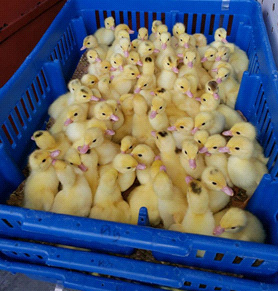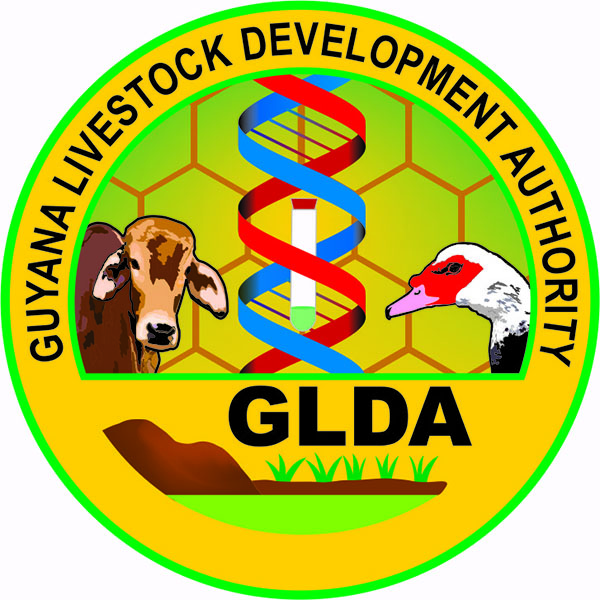The Guyana Livestock Development Authority (GLDA) has imported 1400 Muscovy ducklings from the United States for breeding following recent deaths that are suspected to be as a result of Duck Hepatitis at six farms on the coast.
While the GLDA is currently awaiting a pronouncement from the Cornell University Duck Research Laboratory from samples that were sent in order to guide its response to the deaths, GLDA Chief Executive Officer Nigel Cumberbatch, in a statement yesterday, said the imported ducklings would be used for breeding for the GLDA and the hatchlings would be sold to farmers.
“These ducklings were imported from the USA and they were declared free of any infectious or contagious disease such as Duck Virus Hepatitis, Duck Virus Enteritis, Cholera, Salmonella and other such diseases by the United States Department of Agriculture. The hatchlings from this importation would be sold to the farming community for rearing for meat production,” Cumberbatch noted.

His statement added that the Muscovy ducks are used primarily for meat production as the meat contains less fat than the other breeds of ducks. It further noted that within 12 weeks, male Muscovy ducks can attain as much as 5.5 kg once proper animal husbandry is practised.
Farmers were concerned that there would have been a shortage of duck meat on the market if the deaths were not addressed.
High mortality rates
The GLDA, on May 18th, had issued a notice advising that its surveillance team had seen an increased mortality rate among the ducklings being hatched at its hatchery. The agency said that it had also been told by some farmers that a “similar occurrence was taking place on a number of farms throughout the various regions.”
The high mortality rates were recorded primarily in the Muscovy breed of ducklings, with the ducklings most affected being from the farms that toll hatch at the GLDA hatchery. Consequently, the GLDA closed the hatchery and initiated a surveillance and monitoring exercise.
Based on symptoms, the GLDA suspects’ farms are affected by the Duck Viral Hepatitis (DVH). The virus is a highly fatal, contagious disease of young ducklings between 1 and 28 days old.
An advisory published in yesterday’s edition of the Guyana Chronicle by the GLDA stated that it is suspected that six duck farms in regions Three, Four and Six were contaminated by the virus.
“We wish to further indicate that to date only six private farms are affected by this disease outbreak and we have successfully been able to contain it, mainly as a result of our actions to close our hatchery, quarantine the affected farms and restrict the movements of ducklings,” the advisory said.
The advisory further explained that to date the GLDA Duck Unit at Mon Repos has not been affected or shown any signs or symptoms of this disease. “Therefore we are convinced that this outbreak affected only those six farms that we have quarantined that toll hatch at the GLDA hatchery,” the advisory stated.
Upon the discovery of the illness plaguing the duck industry, farmers told Stabroek News that they were instructed by the GLDA to halt production until further notice. However, many highlighted that they are experiencing losses daily.
GLDA nonetheless pointed out that the disease affecting the ducklings has not manifested itself in other poultry sectors, namely chicken, turkey and Guinea Bird. As a result, it assured the public that meat and products from those birds and ducks are safe for consumption. The suspected DVH illness only affected ducklings from the Muscovy breed between 3 and 15 days old.
Illegal importation
Additionally, the GLDA said that should the results from the Cornell University laboratory confirm its suspicions of DVH, it suspects that the disease was introduced into Guyana by “perhaps the illegal importation of hatching eggs or ducklings.”
GLDA reminded the public and “all livestock farmers in particular, that the illegal importation of livestock and livestock products into Guyana poses serious risk to the health of humans and animals since it prohibits our ability to ensure that whatever is imported is free from diseases.”
The livestock agency stated that it has also recorded “too many cases of smuggling of dogs and birds into Guyana.” The advisory noted that dogs are affected by numerous diseases that are both detrimental to humans and animals. Dogs can carry illnesses such as rabies and leptospirosis, while birds can be affected by avian influenza, amongst others.
“Persons are therefore encouraged to give their full cooperation to the Ministry to safeguard the health of the nation by reporting any and all instances of illegal animals & livestock product imports (smuggling) to the authority on telephone numbers 220-6556, 6557 or via email at glda1910@gmail.com or the nearest Police Station,” the agency said in its statement.
Due to the suspected DVH, Trinidad and Tobago banned raw and cooked poultry meat from Guyana as a precautionary measure.
Trinidad’s Minister of Agriculture Clarence Rambharat had stated that as a precaution, the Ministry’s Chief Veterinary Office has notified the Customs and Excise Division “of an immediate ban on raw and cooked poultry originating from Guyana. While Guyana and Trinidad and Tobago do not trade with each other in poultry, the ban is precautionary and targets passengers coming into Trinidad and Tobago with raw or cooked poultry in their possession. The ban is instituted because Guyana has advised of the existence of Duck virus hepatitis in a part of Guyana.”
This ban does not affect the local poultry industry since Guyana does not export any meat to the country.





